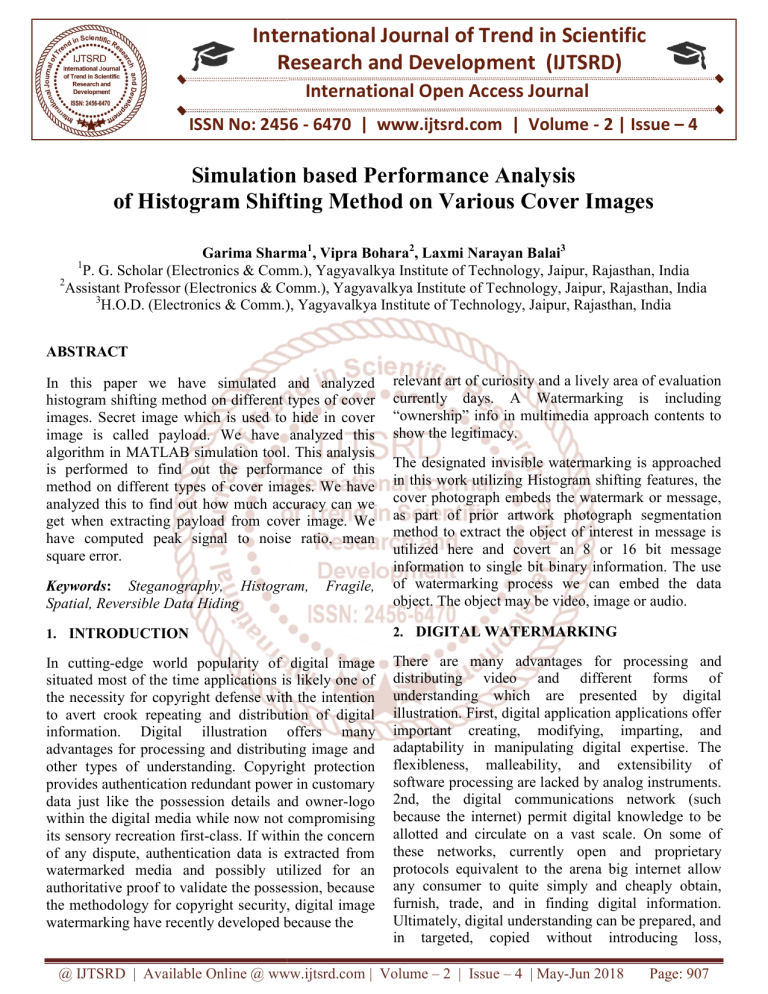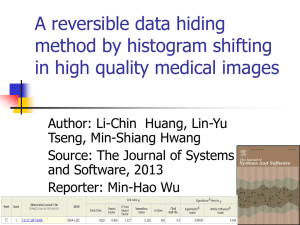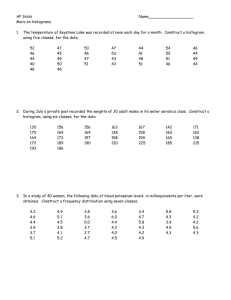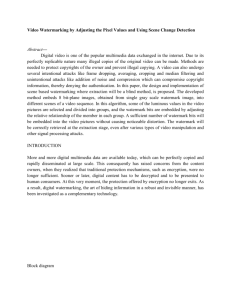
International Journal of Trend in Scientific
Research and Development (IJTSRD)
International Open Access Journal
ISSN No: 2456 - 6470 | www.ijtsrd.com | Volume - 2 | Issue – 4
Simulation
tion based Performance Analysis
of Histogram Shifting Method on Various Cover Images
Garima Sharma1, Vipra Bohara2, Laxmi Narayan Balai3
P. G. Scholar (Electronics & Comm.), Yagyavalkya Institute of Technology, Jaipur, Rajasthan, India
2
Assistant Professor (Electronics & Comm.), Yagyavalkya Institute of Technology, Jaipur, Rajasthan, India
3
H.O.D. (Electronics & Comm.), Yagyavalkya Institute of Technology, Jaipur, Rajasthan, India
1
ABSTRACT
In this paper we have simulated and analyzed
histogram shifting method on different types of cover
images. Secret image which is used to hide in cover
image is called payload. We have analyzed this
algorithm in MATLAB simulation tool. This analysis
is performed
ormed to find out the performance of this
method on different types of cover images. We have
analyzed this to find out how much accuracy can we
get when extracting payload from cover image. We
have computed peak signal to noise ratio, mean
square error.
Keywords: Steganography, Histogram,
Spatial, Reversible Data Hiding
Fragile,
relevant art of curiosity and a lively area of evaluation
currently days. A Watermarking is including
“ownership” info in multimedia approach contents to
show the legitimacy.
The designated
ignated invisible watermarking is approached
in this work utilizing Histogram shifting features, the
cover photograph embeds the watermark or message,
as part of prior artwork photograph segmentation
method to extract the object of interest in message is
utilized
tilized here and covert an 8 or 16 bit message
information to single bit binary information. The use
of watermarking process we can embed the data
object. The object may be video, image or audio.
1. INTRODUCTION
2. DIGITAL WATERMARKING
In cutting-edge
edge world popularity of digital image
situated most of the time applications is likely one of
the necessity for copyright defense with the intention
to avert crook repeating and distribution of digital
information. Digital illustration offers m
many
advantages for processing and distributing image and
other types of understanding. Copyright protection
provides authentication redundant power in customary
data just like the possession details and owner
owner-logo
within the digital media while now not com
compromising
its sensory recreation first-class.
class. If within the concern
of any dispute, authentication data is extracted from
watermarked media and possibly utilized for an
authoritative proof to validate the possession, because
the methodology for copyright security,
ecurity, digital image
watermarking have recently developed because the
There are many advantages for processing
processin and
distributing video and different forms of
understanding which are presented by digital
illustration. First, digital application applications offer
important creating, modifying, imparting, and
adaptability in manipulating digital expertise. The
flexibleness,
bleness, malleability, and extensibility of
software processing are lacked by analog instruments.
2nd, the digital communications network (such
because the internet) permit digital knowledge to be
allotted and circulate on a vast scale. On some of
these networks,
tworks, currently open and proprietary
protocols equivalent to the arena big internet allow
any consumer to quite simply and cheaply obtain,
furnish, trade, and in finding digital information.
Ultimately, digital understanding can be prepared, and
in targeted,
ted, copied without introducing loss,
@ IJTSRD | Available Online @ www.ijtsrd.com | Volume – 2 | Issue – 4 | May-Jun
Jun 2018
Page: 907
International Journal of Trend in Scientific Research and Development (IJTSRD) ISSN: 2456-6470
degradation, or noise. For example, a single digital
video sign may produces an infinite number of perfect
copies. In distinction, the addition of noise to a replica
from analog signal processing is ineluctable.
In the past years, Watermarking ways are projected
for these services within which the copyright info is
enclosed into transmission capabilities as a way to
safeguard possession. The study is now studying
watermarking schemes to preserve multimedia
content. Digital watermarking is a system which can
serve functions. An tremendous range of
watermarking theme projected to cover copyright
marks and secondary data in digital snapshots, video,
audio and some alternative transmission objects. A
watermark can be defined by a kind of photograph or
text that's the paper supplies proof of its legitimacy,
nonetheless affected. Digital watermarking is
companion delay of this conception within the digital
World. Unique development in recent years of the
online has highlighted the requirement for
mechanisms to support the possession of digital media
thoroughly identical copies of digital information, be
it graphics, audio or text, is made and distributed
handily. Even as the aforementioned benefits present
substantial possibilities for creators, the potential to
type best copies and the simply applying that these
copies shall be disbursed conjointly facilitate misuse,
non legal repetition and distribution piracy,
plagiarism, and misappropriation. Content material
creators and house owners are quandary related to the
penalties of forbidden repeating and distribution on a
big scale. This predicament isn't entirely theoretical.
Fiscal loss coming up from proscribed repeating and
distribution of copyrighted matter is computable to be
inside the billions of dollars. Lately, long-established
web software package exceptionally based on a peerto- peer (P2P) design (similar to Kazaa, BitTorrent,
eDonkey and Gnutella) has been used to share
(distribute) copyrighted track, films, software, and
various substances. Future P2P methods could encode
the info being shared, its users, aid domain anonymity
a better number of users, and be extra powerful. These
advances in P2P programs will make enormous
challenges for copyright enforcement. Hence, there's
the best wish for ways which can continue the
financial value of digital video and defend the rights
of content house owners.
3. REVERSIBLE DATA HIDING
Hiding data inevitably destroys the host image even
though the
distortion introduced by hiding is
imperceptible to the human visual system. However,
there are some sensitive images where any embedding
distortion made to the image is intolerable, such as
military images, medical images or artwork
preservation. For example, even slight changes are not
accepted in medical images due to a potential risk of a
physician giving a wrong explanation of the image.
Hence, reversible data hiding techniques give a
solution to the problem of how to embed a large
message in digital images in a lossless manner so that
the image can be completely restored to its original
state before the embedding occurred. Procedure of
reversible data hiding is shown in Fig 1.
Fig-1: Reversible data hiding process
In this process the sender embeds the message M to a
host image H in a lossless manner so that after the
message is extracted from the watermarked image, the
exact copy of the original image is obtained.
reversible data hiding technique can be used as a
fragile invertible authentication watermarking that
embeds an authentication code in a digital image in a
reversible way. Only when the embedded
authentication code matches the extracted message,
the image is deemed authentic.
4. HISTOGRAM SHIFTING
The histogram modification technique involves
generating histogram and finding the peak point and
the zero point and shifting histogram bins to embed
message bits. For a given host image, we first
generate its histogram and find a peak point and a
zero point. A peak point corresponds to the grayscale
value which the maximum number of pixels in the
given image assumes. On the contrary, a zero point
corresponds to the grayscale value which no pixel in
@ IJTSRD | Available Online @ www.ijtsrd.com | Volume – 2 | Issue – 4 | May-Jun 2018
Page: 908
International Journal of Trend in Scientific Research and Development (IJTSRD) ISSN: 2456-6470
2456
the given image assumes. Fig 2 shows a histogram of
an image.
Fig-2:
2: Histogram of image
calculated by MATLAB tool. Fig.5 represents a cover
image and Fig. 6 represents histogram of that image.
Fig. 7 represents watermarked image.
Fig4: Secret image
In the above image peak point is at 2 and the zero
point is at 7. Let P be the value of peak point and Z be
the value of zero point. The range of the histogram,
[P+1, Z-1], is shifted to the right-hand
hand side by 1 to
leave the zero point at P+1 as shown in Fig 3.
Fig-5:
5: CCTV 1 image as cover image
Fig-3:
3: Shifting a range of histogram
Once a pixel with value P is encountered, if the
message bit is “1,” increase the pixel value by 1.
Otherwise, no modification is needed. We note that
the number of message bits that can be embedded into
an image equals to the number of pixels which are
associated with the peak point.
5. EXPERIMENTAL RESULTS
In the proposed research we have considered various
types of cover images. Secret image (payload) is
shown in Fig 4. Histogram of cover image is
Fig-6:
6: Histogram of cover image
@ IJTSRD | Available Online @ www.ijtsrd.com | Volume – 2 | Issue – 4 | May-Jun
Jun 2018
Page: 909
International Journal of Trend in Scientific Research and Development (IJTSRD) ISSN: 2456-6470
have taken all the parameters correct. We have
calculated some parameters also which are shown in
table below.
Table 1: Resultant parameters
Fig. 7 Watermarked image
Similarly we have taken other images also as cover
image and performed data hiding process on each
image. Other cover images are shown below:
Image
Rando
m
Index
1
Global
Consiste
ncy
Error
0
Variation
of
Informatio
n
-3.5527
CCTV1
PSNR
INFINITE
CCTV2
1
0
0
INFINITE
YIT
0.9980
0.1051
0.6456
46.1283
6. CONCLUSION
This research frames a embedding model that can
embed or hide a secret image into a cover image using
histogram shifting method of reversible data hiding.
The message examined in this research work is a
binarized class of image that is embedded into a gray
cover image. The proposed method of watermarking
obtains a satisfactory level of watermarking.
In future we will implement this technique on
different types of cover image and different types of
secret image (payload) to examine the different
features such as embedding capacity, signal to noise
ratio etc.
Fig. 8 CCTV 2 image
REFERENCES
1. Abraham, V. K. 2002. The International
Conference
on
Commercial
Floriculture,
Summary Report, 11-12 August, Bangalore.
2. Yeo and M.M. Yeung,: ‘Analysis and synthesis
for new digital video application,’ icip,
International
Conference
on
Image
Processing(ICIP97),vol. 1,pp.1,1997.
3. M. Natarajan, G. Makhdumi1,: ‘Safeguarding the
Digital
Contents:
Digital
Watermarking,’
DESIDOC Journal of Library & Information
Technology,vol.29,May 2009,pp. 29-35.
Fig. 9 YIT image
This is the process of hiding secret image in cover
image at transmitter side and extracting secret image
from cover image at receiver side. In this case we
4. C.I. Podilchuk, E.J. Delp,: ‘Digital watermarking:
algorithms and applications,’ Signal Processing
Magazine, vol. 18,pp. 33-46, IEEE, July 2001.
5. G. Doerr, J.L. Dugelay,: ‘Security Pitfalls of
Frame-by-Frame
Approaches
to
Video
Watermarking,’
Signal
Processing,
IEEE
Transactions, vol. 52,pp. 2955-2964, 2004.
@ IJTSRD | Available Online @ www.ijtsrd.com | Volume – 2 | Issue – 4 | May-Jun 2018
Page: 910
International Journal of Trend in Scientific Research and Development (IJTSRD) ISSN: 2456-6470
6. M. K. Thakur, V. Saxena, J.P.Gupta,: ‘A
Performance Analysis of Objective Video Quality
Metrics for Digital Video Watermarking,’
Computer Science and Information Technology
(ICCSIT),2010,
3rd
IEEE
International
Conference, vol. 4,pp. 12-17,2010.
7. S. Voloshynovskiy, S. Pereira, T. Pun,: ‘
Watermark attacks,’ Erlangen Watermarking
Workshop 99, October 1999.
8. G. Langelaar, I. Setyawan, and R. Lagendijk,: ‘
Watermarking Digital Image and Video Data: A
State of - Art Overview,’ IEEE Signal Processing
Magazine, vol.,pp. 20-46, Sep. 2000.
9. F. Hartung and B. Girod ,: ‘ Watermarking of
uncompressed and compressed video,’ Signal
Processing, 1998,vol. 66, no. 3,pp. 283-301.
@ IJTSRD | Available Online @ www.ijtsrd.com | Volume – 2 | Issue – 4 | May-Jun 2018
Page: 911



